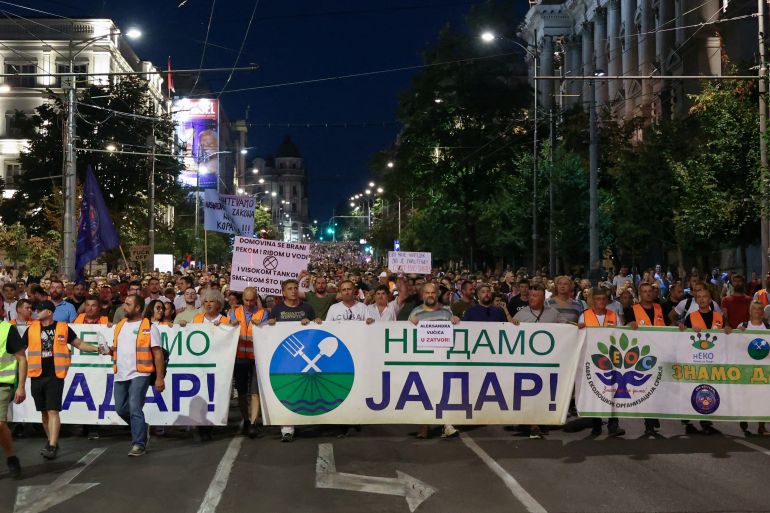Thousands protest in Serbia’s Belgrade against lithium mining project
Protesters say they fear project by mining giant Rio Tinto would pollute water sources and endanger public health.
People attend a protest in Belgrade, Serbia, against a lithium mining project in the Balkan country [Zorana Jevtic/Reuters]Published On 10 Aug 202410 Aug 2024
Thousands of people have taken to the streets of the Serbian capital to protest against the rebooting of a controversial lithium mine set to serve as a vital power source in Europe’s green energy transition.
In advance of Saturday’s rally in Belgrade, two leading protest figures said they were briefly detained by security officials who warned that any moves to block roads during the demonstration would be seen as illegal.
Keep reading
list of 3 itemsend of list
“We came here today to raise our voice against something that is beyond politics,” popular actor Svetlana Bojkovic said from the rally, where a large crowd chanted “There will be no mining”, among other slogans.
Serbia has vast lithium deposits near the western city of Loznica, where a mining project being developed by the Anglo-Australian mining giant Rio Tinto has been a perennial political fault line in the Balkan country over its potential environmental impacts.
The deposits were discovered in 2004, but weeks of mass protests forced the government to halt the project in 2022.
But the government recently made a U-turn on the issue following a court decision last month that said the order to revoke the permits awarded to Rio Tinto was “not in line with the constitution and the law”.
People attend the protest in Belgrade against the lithium mine [Darko Vojinovic/AP Photo]
Days later, the Serbian government greenlit the project’s restart and signed a memorandum of understanding with the European Union that is seen as the first step in developing Serbia’s lithium resources.
Lithium is a strategically valuable metal needed for electric vehicle batteries, making it key for helping the car industry shift to greener production.
The project, however, has continued to be unpopular with many in Serbia due to concerns the mine would pollute water sources and endanger public health.
“I am in Belgrade because the survival of life in Serbia is being defended here,” said Slobodan Stanimirovic, a 58-year-old from western Serbia’s Radjevina, near the site of the future mine.
The protest in Belgrade was the latest in a series of demonstrations held across Serbia after the mine’s licences were reinstated.
Activists and demonstrators have called on legislators to pass a law permanently banning the mining of lithium and boron in the country.
Reporting from Belgrade on Saturday, Al Jazeera’s Jelena Glusac said more people joined the protest against the mining project than recent rallies on other issues, including demonstrations last year following two mass shootings.
“It seems like the lithium [mine proposal] managed to gather more people than any other subject,” Glusac said.
Environmental groups said they were prepared to block major traffic arteries across Serbia and engage in civil disobedience if the government refused to act before an August 10 deadline set by activists.
Serbian President Aleksandar Vucic has repeatedly pledged that no mining operations will begin until guarantees about environmental safety protocols are established.
